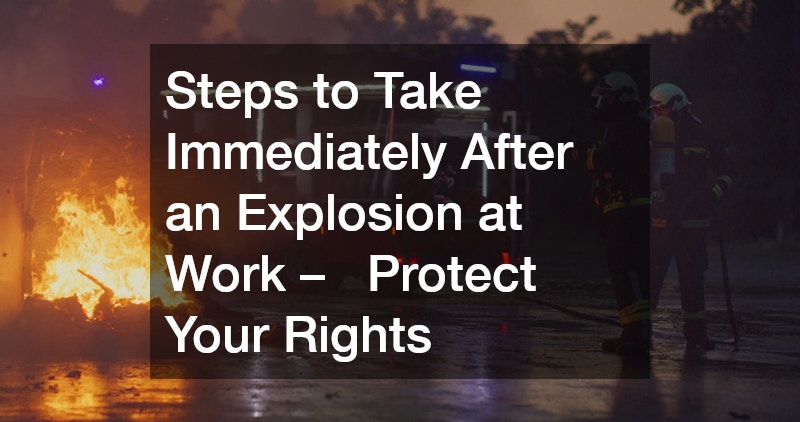
Key Takeaways
-
Workplace explosions require immediate action to protect safety, health, and legal rights.
-
Seek prompt medical evaluation, even for minor injuries, to prevent complications and document evidence.
-
Notify your employer in writing and include detailed incident information, witnesses, and safety concerns.
-
Collect comprehensive evidence: photos, videos, personal logs, and witness statements.
-
File a workers’ compensation claim accurately and within state-specific deadlines.
-
Consult a workers compensation lawyer early to navigate complex claims, negotiate settlements, and handle disputes.

Workplace explosions are among the most serious occupational hazards, capable of causing life-altering injuries, permanent disabilities, or even fatalities. Industries such as manufacturing, chemical processing, oil and gas, construction, and mining face elevated risks due to the materials and equipment they handle. Beyond immediate physical injuries, explosions often result in long-term health complications, emotional trauma, and financial burdens. How an injured worker responds in the hours and days following such an incident can significantly impact both recovery and legal outcomes.
Immediate and structured action is essential not only for personal safety and medical care but also for ensuring that any workers’ compensation claim is complete, timely, and well-supported. Missteps—like delayed medical attention, incomplete reporting, or insufficient documentation—can reduce benefits or even result in claim denial. This guide outlines practical steps for injured workers to protect their health, preserve evidence, and safeguard their legal rights. Legal professionals and employees alike can use these strategies to navigate complex post-explosion claims effectively.
Ensure Immediate Safety
Your first priority after an explosion is protecting yourself and those around you. Explosions create multiple hazards, including secondary blasts, structural collapses, fires, chemical exposure, and airborne debris. Quick, decisive action can prevent additional injuries and save lives. Employees should focus on removing themselves from immediate danger while ensuring that others can evacuate safely.
Following emergency procedures can not only prevent harm but also provide crucial documentation for a workers’ compensation claim. Showing that you followed your employer’s safety protocols can be vital if the employer or insurance company disputes the circumstances of the incident. In addition, careful observation of workplace hazards may support claims involving employer negligence or safety violations. Consulting a workers compensation lawyer early can help clarify how safety compliance impacts your legal rights.
Key Safety Actions:
-
Move immediately to a designated safe area away from hazards such as fire, debris, or gas leaks.
-
Alert supervisors and coworkers to ensure everyone is accounted for.
-
Follow workplace emergency procedures exactly, including evacuation routes and fire alarms.
-
Call emergency services (911) if people are injured, trapped, or at risk.
-
Provide first aid to coworkers only if it is safe to do so.
Seek Immediate Medical Attention
Even minor injuries following an explosion should be evaluated by medical professionals, as many injuries are not immediately visible. Internal injuries, hearing damage, smoke or chemical inhalation, and concussive trauma may appear minor initially but can become severe if untreated. Prompt medical care is also critical for documenting the injury for a workers’ compensation claim.
Explosion-related injuries often include burns, fractures, crush injuries, lacerations, hearing loss, traumatic brain injuries, and respiratory complications from smoke or chemicals. Early documentation of these injuries helps support a claim and ensures that future medical needs are considered in settlement calculations.
Medical Steps to Take:
-
Call 911 immediately for life-threatening injuries.
-
Visit an emergency room or urgent care facility even for minor injuries.
-
Keep copies of all medical records, including ER reports, physician notes, lab results, and prescriptions.
-
Follow all prescribed care plans, including medications, physical therapy, and follow-up appointments.
-
Take photographs of visible injuries and maintain a detailed log of symptoms over time.
Early and thorough medical attention protects both health and legal rights. Insurance companies frequently require medical evidence before approving benefits. A workers compensation lawyer can advise on how to collect, organize, and submit this documentation to strengthen a claim.

Notify Your Employer
Timely reporting to your employer is a critical step in protecting legal rights. Most states require employees to report workplace accidents within a specific timeframe to qualify for workers’ compensation benefits. Proper notification creates a paper trail, which can be invaluable if the employer or insurance company disputes the incident.
Employees should provide a clear, detailed account of the explosion, including the time, location, cause, and any witnesses. Written notification, such as an email or formal incident report, is preferred as it serves as evidence in future legal proceedings. A workers compensation lawyer can advise on the most effective way to report an incident without inadvertently limiting your rights.
Employer Notification Checklist:
-
Notify your supervisor or HR representative immediately.
-
Submit a written incident report describing the accident in detail.
-
Include witness names and contact information.
-
Retain copies of all communications to maintain proof of notification.
-
Document any safety hazards or unsafe conditions observed before or during the explosion.
Document the Incident Thoroughly
Thorough documentation of the explosion is essential for both medical and legal purposes. Evidence collected immediately after the incident ensures accuracy and supports claims of injury severity and employer negligence. Documentation should cover the scene, injuries, safety violations, and witness statements.
Photographs and videos of the accident site, damaged equipment, and unsafe conditions provide visual evidence that can strengthen a claim. Witness statements and detailed personal logs of injuries, symptoms, and treatment help validate the extent of the harm caused. A workers compensation lawyer can help ensure that documentation is comprehensive and submitted effectively to support your case.
Documentation Checklist:
-
Photograph or video the explosion site, equipment, and hazards.
-
Record unsafe conditions that contributed to the incident.
-
Keep a personal log of injuries, symptoms, and treatments.
-
Collect witness contact information and statements.
-
Maintain copies of all correspondence with supervisors, HR, and safety officers.
File a Workers’ Compensation Claim
Filing a claim is essential to access medical coverage, wage replacement, and rehabilitation support. Claims must be accurate, complete, and filed within state-specific deadlines to avoid rejection.
Workers’ compensation claims for explosion injuries often involve complex medical conditions and multiple treatments, making it crucial to attach thorough documentation. A workers compensation lawyer can review your claim to ensure completeness, prevent errors, and improve the likelihood of full benefit approval.
Claim Filing Checklist:
-
Complete your state-specific claim form carefully.
-
Attach all medical records, incident reports, photographs, and witness statements.
-
Notify your employer in writing about the claim submission.
-
Keep copies of all filings and correspondence.
-
Track your claim’s progress and respond to insurer requests promptly.
Consult a Workers Compensation Lawyer
Explosion-related injuries often require complex medical care and may result in long-term disability or rehabilitation. Consulting a workers compensation lawyer early ensures that claims are properly filed, legal rights are protected, and compensation reflects the full scope of your injuries.
A lawyer can assist in negotiating fair settlements, handling denied claims or appeals, and assessing the long-term impact of injuries on medical care and employment. Legal representation is especially critical when employer negligence or safety violations are involved.
Legal Support Checklist:
-
Seek an attorney experienced in explosion-related workplace injuries.
-
Bring all incident documentation, medical records, and witness statements.
-
Discuss legal fees, retainer agreements, and contingency arrangements.
-
Review settlement offers or insurance communications with your lawyer.
-
Plan for potential long-term medical or disability needs with professional guidance.
Preserve Long-Term Evidence and Follow-Up
Explosion injuries often require ongoing care, rehabilitation, or job accommodations. Maintaining comprehensive records ensures that future claims, medical needs, and potential appeals are properly documented.
Long-Term Preservation Checklist:
-
Keep a dedicated folder for all medical and legal records.
-
Update records regularly with new treatments, test results, and symptoms.
-
Photograph lingering injuries, scars, or mobility limitations.
-
Track all related expenses, including medical costs, transportation, and caregiving.
-
Consult your workers compensation lawyer regarding additional benefits for long-term complications.
Consistent documentation helps support ongoing benefits and protects against disputes over claim adequacy. Long-term records also aid in appeals or renegotiation of settlements if new complications arise.
Taking these steps ensures injured workers can access medical care, protect legal rights, and maximize compensation. Legal and medical diligence in the aftermath of a workplace explosion can prevent disputes, reduce delays, and safeguard long-term recovery and financial stability.

